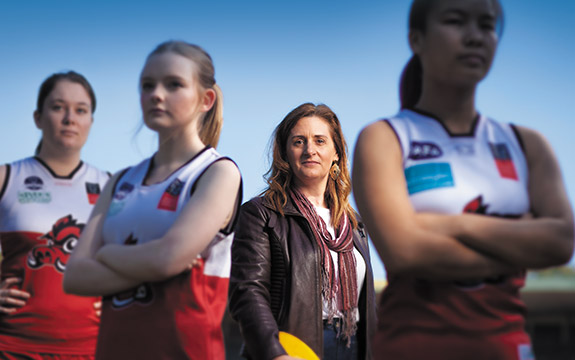
The right tone of conversation about female athletes is among recent guiding principles for gender equality.
From media coverage to banter between parents, considering the way we speak about women in sport is one key way to promote gender equality, Associate Professor Emma Sherry, from Swinburne Business School, has found.
In her work, Sherry has consistently pointed out that sport is a powerful lens through which to look at gender politics.
"It might seem like a really small thing, but the message that derogatory language sends to that football club or community sports organisation is that women are less than men," she explained. "There are some people in the community that internalise that message, then take it further and treat women differently. In some cases that can end up in physical harm."
In 2018, Sherry led a group developing a set of principles for the State Government of Victoria on how to promote and evaluate gender equality at sports clubs and recreation centres.
The principles are partly a response to the 2016 Victorian Royal Commission into Family Violence, which heard that one in six Australian women and one in 16 Australian men had been subjected to partner violence. A 2018 bill helped establish the Respect Victoria campaign, which is working to stop violence by looking at culture.
The principles encourage sports organisations to be proactively inclusive. Over the past two years, Victoria has rolled them out in a pilot project with a number of state sport organisations, local government authorities and regional sports assemblies.
"It's not a panacea, but I think it creates an environment where people call out bad behaviours and encourage gender equality," said Sherry.
She has already seen changes, she added. Her previous work had highlighted media images of sporting women in poses that failed to reflect their sporting prowess. Sherry found that female athletes and commentators are also consistently trolled on Twitter.
In 2017, with colleagues from La Trobe University, she tracked how the inaugural season of the women's Australian Football League was reported in the media and discussed on Twitter. They were waiting for a backlash. Instead, the launch of the women's league was met with a groundswell of media and public support.
But just two years later, in 2019, Carlton player, Tayla Harris, received a barrage of sexualised and abusive comments after tweeting a photo that captured the superb athleticism of her kicking action. Sherry thought that five or 10 years ago these comments would have just been accepted, but this time people spoke out. "A whole lot of women and men stood up and said 'back off, she's just kicking a ball."






